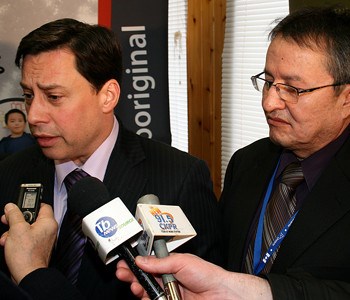Self-sustainability is the only way First Nations communities can ensure their economic futures are sound, says the regional chief of the Assembly of First Nations.
Angus Toulouse on Thursday said the time for talk is over, but he’s encouraged that the federal and provincial governments are finally aware that action is needed to make it happen.
Speaking at the Ontario First Nations Economic Forum at Fort William First Nation, Toulouse said he hoped the first step would be a government-driven report card that details the economic opportunities that might exist in First Nations communities in Ontario.
"That’s what we want to evaluate in six months, and see if those things are actually happening," cautioning that economic development is but one aspect of aboriginal quality of life.
"We’ve identified nine elements or building blocks that need to be addressed. These are going to be used as tools or assessments by the communities in terms of where they’re at in each of these sessions."
Nishnawbe Aski Nation Grand Chief Stan Beardy said his territory’s plan to build a sustainable economy means fundamental issues, like ownership, jurisdiction and governance, must also be addressed in better fashion than the recent Kitchenuhmaykoosib Innuwug debacle. That series of events saw six community leaders, including Chief Donny Morris, jailed when they refused to allow junior mining company Platinex to explore their traditional lands.
But it goes much deeper than that, he added, acknowledging the need for economic development and less reliance on government handouts is the only way to survive. How it should be structured is the million-dollar question, Beardy said.
"At the present time I have a very high rate of suicide amongst my young people, and I think a lot of it has to do with hopelessness. I think when we talk about sustainability, we’re talking about our participation in the global economy," Beardy said.
"And I think that is crucial, not only for my people. When we talk about sustainability, we’re talking about maintaining prosperity for all of Ontario."
It has to be done on their own terms, Beardy continued, which is why a forum like this holds so much importance.
"It becomes important to network, because in order for First Nations far north communities to participate in opportunities, we will need partnerships. That’s what we’re here to look at, potential partnerships, because we don’t have the expertise or the capital, so it’s essential we get to network," Beardy said.
Also in attendance was Ontario Minister of Aboriginal Affairs Brad Duguid.
Duguid, who spoke of a new era in relations between First Nations and non-First Nations communities, said together the two sides are trying to build a brighter future for the next generation.
He said there are two areas that need improvement: education and economic development. One thing’s for sure, change is necessary and the feedback garnered from the two-day conference must be taken seriously.
"It’s absolutely essential that what we do today is not the old way of doing things, because that failed miserably," Duguid said. "That’s government saying we’ve got the answers, we know the answers, this is what we must do. The ideas, solutions and the way forward has to come from a true partnership. And a lot of those ideas, in fact the majority of them, will come from leaders such as Regional Chief Angus Toulouse."
Duguid on Thursday also announced a procurement agreement with Ontario Aboriginals that will give them a leg up tendering contracts in their own communities.
Sign in or register
- Messages
- Post a Listing
- Your Listings
- Your Profile
- Your Subscriptions
- Your Likes
- Your Business
- Support Local News
- Payment History
Registered Users
Already have an account?
New Users
Create a free account.
